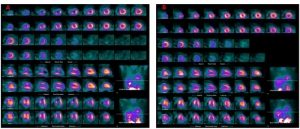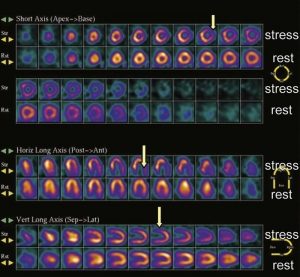Nuclear Stress Test
Definition 
A nuclear stress test is a test that uses a radioactive substance (known as a tracer) to produce images of the heart muscle. When combined with an exercise test, the nuclear scan helps determine if areas of the heart do not receive enough blood.
Purpose
The exercise, nuclear test is especially useful in diagnosing coronary artery disease, the presence of blockages in the coronary arteries. These are the arteries that supply oxygen to the heart muscle.

Before The Test
IF YOU ARE NURSING OR IF YOU THINK YOU MAY BE PREGNANT, INFORM THE DOCTOR OR NUCLEAR TECH BEFORE THE EXAMINATION.
When To Come
- Please arrive at least 15 minutes ahead of your scheduled appointment time. If you are not on time you may end up staying longer to finish your test.
- We ask that you please notify us at least 48 hours prior to your appointment if you need to reschedule your appointment.
- If you have asthma or any respiratory condition, please notify us of this condition when we make your appointment. We may need to change the type of test that we scheduled if you have a respiratory condition.
What To Wear
- Wear comfortable two-piece loose clothing and walking shoes (i.e.: tennis shoes).
How Long Will The Test Last
- If you are scheduled for a one day study, then plan on being in our office for 4 hours.
- If you are scheduled for a two day study, then plan on being in our office 2 hours each day.
Medications
- Please notify us if you are diabetic, hypoglycemic, or asthmatic. If you are diabetic, please adjust your insulin or oral medication to your dietary intake.
- If you use an inhaler, please bring this with you.
Dietary
- ABSOLUTELY NO CAFFEINE 24 hours prior to your study. No coffee, tea, chocolate, or soft drinks. This includes decaffeinated beverages. Caffeine will alter your scan results. If you are scheduled prior to 12 noon, you may eat a light breakfast. If you are scheduled after 12 noon, you may have a light breakfast and light lunch. We want you to arrive “hungry.”
NO SMOKING OR VIGOROUS EXERCISE 8 HOURS PRIOR TO YOUR STUDY
Notice Concerning Testing Regulations: In order to comply with the Risk Management policies of Gowani Medical Associates, family members may not be present in the test area during patient testing, unless medically necessary. Otherwise, family members must wait in the main lobby.
During The Test
- The test has two parts: the exercise imaging portion and the rest imaging portion.
- – Several electrodes (small sticky patches) will be placed on your chest to obtain an electrocardiogram (ECG). This will record your heart’s electrical activity.
- – An intravenous (IV) line will be started in a vein in your arm. This will allow injection of the radioactive tracer during exercise.
- – After the IV is placed you will be given the first dose of radioactive material. There are no side effects or allergies to this medication
- – Once the first injection is done, you will be asked to drink cold water and walk for several minutes. This will get the radioactive material flowing through your system quicker.
- – Imaging portion: You will then lie flat on a special table under a scanning camera. Several pictures of the heart will be taken at various angles. You should remain still while the pictures are being taken. This part can take up to 15 minutes.
- – Depending on the type of exam that is ordered, you will be exercising several minutes on a treadmill. If you cannot walk on a treadmill, then a prescribed medication will be injected over a several minute period. In either case, the purpose is to increase the workload being placed on your heart.
- – You will be instructed to report any symptoms, such as chest pain, shortness of breath, or dizziness. Try to exercise for as long as you are able to, as this will increase the accuracy of the test.
- – If you are walking on the treadmill, tell the nuclear technician when you are almost to the point when you can no longer exercise. At this point, the tracer will be injected into the intravenous line. You will be asked to continue to exercise for another minute or so after the injection.
- – After the stress test portion is completed, you will be asked to return in 30-45 minutes to have additional pictures taken without repeating exercise. These images are compared to the images obtained during the first part of the test. The technician will give you specific instructions regarding when to return, and what food you can eat.
After The Test
- – No sedation is given during this test, therefore, you will be able to drive home directly after the test.
- – A copy of your test results will be sent to your referring physician.
- – This test generally provides more information than an exercise stress test. This will help your doctor make an accurate diagnosis and develop a treatment plan that is best for you.
- – Please drink plenty of water for three days after the study to flush out the radioactive material from your system.
- – If you are planning on flying within three days after your test, please inform the nuclear technician. You will be given a card to show the security you have recently underwent a nuclear test.

